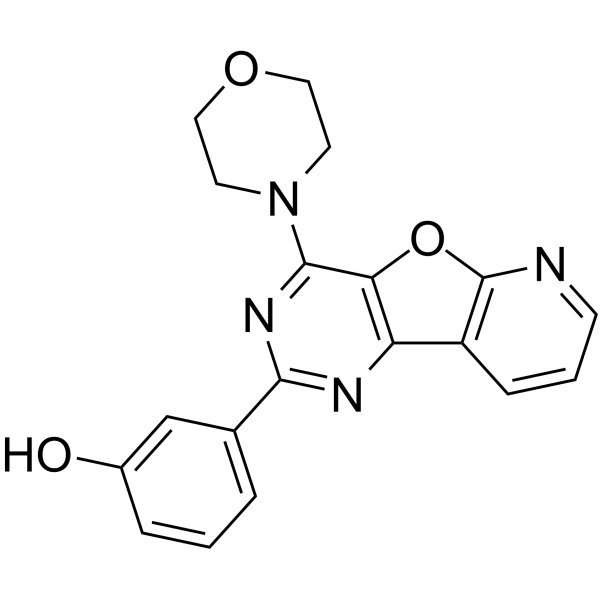Home
Products
PI-103



| Product Name | PI-103 |
| Price: | Inquiry |
| Catalog No.: | CN00412 |
| CAS No.: | 371935-74-9 |
| Molecular Formula: | C19H16N4O3 |
| Molecular Weight: | 348.36 g/mol |
| Purity: | >=98% |
| Type of Compound: | Alkaloids |
| Physical Desc.: | Powder |
| Source: | |
| Solvent: | Chloroform, Dichloromethane, Ethyl Acetate, DMSO, Acetone, etc. |
| SMILES: | Oc1cccc(c1)c1nc(N2CCOCC2)c2c(n1)c1cccnc1o2 |
| Contact us | |
|---|---|
| First Name: | |
| Last Name: | |
| E-mail: | |
| Question: | |
| Description | PI-103 is a potent PI3K and mTOR inhibitor with IC50s of 8 nM, 88 nM, 48 nM, 150 nM, 20 nM, and 83 nM for p110α, p110β, p110δ, p110γ, mTORC1, and mTORC2. PI-103 also inhibits DNA-PK with an IC50 of 2 nM. |
| Target | p110α:8 nM (IC50) p110β:88 nM (IC50) p110δ:48 nM (IC50) p110γ:150 nM (IC50) PI3KC2β:26 nM (IC50) PI3KC2α:1 μM (IC50) hsVPS34:2.3 μM (IC50) mTORC1:20 nM (IC50) mTORC2:83 nM (IC50) DNA-PK:2 nM (IC50) ATR:850 nM (IC50) ATM:920 nM (IC50) PI4KIIIβ:50 μM (IC50) |
| In Vitro | PI-103 exhibits antiproliferative properties in a panel of human cancer cell lines[1]. PI-103 is essentially cytostatic for cell lines and induced cell cycle arrest in the G1 phase. In blast cells, PI-103 inhibits leukemic proliferation, the clonogenicity of leukemic progenitors and induces mitochondrial apoptosis, especially in the compartment containing leukemic stem cells [2]. PI-103 potently inhibits both the rapamycin-sensitive (mTORC1, IC50=20 nM) and rapamycin-insensitive (mTORC2, IC50=83 nM) complexes of the protein kinase mTOR[4]. |
| In Vivo | PI-103 shows therapeutic activity against a range of human tumor xenografts, exhibiting inhibition of angiogenesis, invasion, and metastasis, as well as direct antiproliferative effects[1]. PI-103 induces immunosuppression promoting in vivo tumor growth and inhibiting apoptosis. Tumors from PI-103-treated mice shows higher levels of cyclin D1 and more proliferating cells[3]. |
| Cell Assay | For proliferation assays, MOLM14, OCI-AmL3 and MV4-11 cells are cultured during 48 h at 105 cells/mL, in triplicate, in 10% FCS, without or with 0.1 or 1 μM PI-103, and then pulsed 6 h with 1μCi (37 kBq) [4H]-thymidine. The amounts oadioactivity are determined after trichloracetic acid precipitation[2]. |
| Animal Admin | Mice[3] Five to six month old males of either FVB/N strain or nude BALB/c strain are injected subcutaneously with one million cells in PBS. When tumor reaches between 50 and 100 mm3, mice are treated with 10 mg/kg or 70 mg/kg of PI-103 and/or 50 mg/kg Sorafenib by IP injection daily. Control mice are treated with the same volume of DMSO. Tumor size and mice weight is monitored every 2 days. When mice are sacrificed, tumors are dissected and processed[3]. |
| Density | 1.409 g/cm3 |
| Boiling Point | 520.25ºC at 760 mmHg |
| PSA | 84.51000 |
| LogP | 3.84720 |
| Storage condition | Desiccate at +4°C |